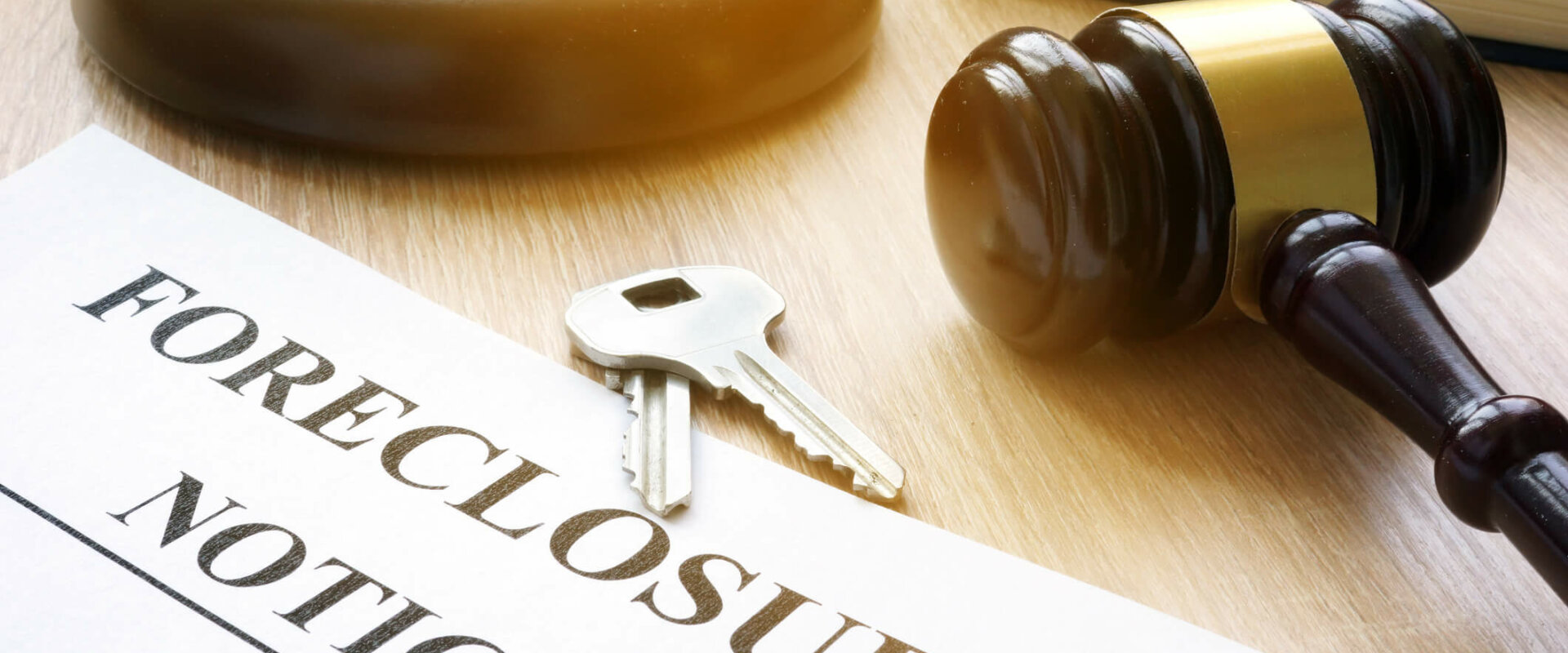
What Does Foreclosure Mean?
Foreclosure is defined as the legal action of taking possession of a mortgaged property when the mortgagor fails or is not able to keep up their mortgage payments.
Have you fallen behind on your mortgage payments? Facing foreclosure is no doubt a stressful and worrying time for you and your family. You aren’t the first person to go through this and you won’t be the last. It happens, you don’t have to feel ashamed or embarrassed. It is important for you to understand what foreclosure means, and the options you have available to you. This guide is meant to help you to discover your options and is in no way considered to be legal advice.
A mortgage payment is one of the biggest financial payments most people have. Because of this, many people who are experiencing financial difficulties can easily fall behind; this can lead to foreclosure.
A loan servicer or lender must wait four months (almost 120 days) before starting the foreclosure process on your property in California, then they must file a “Notice of Default.” This starts the foreclosure process.
Facing Foreclosure in California
There are several options available for you at this time, and we will discuss some of the most common options available when facing foreclosure.
Filing for Bankruptcy

If you are confronting a foreclosure in California, filing for bankruptcy might be an option. You should consult a legal professional before deciding your path. Filing for bankruptcy means you legally declare that you cannot afford to pay your debts. It can have prolonged damaging effects on your credit.
Once you have filed for bankruptcy, an automatic stay process starts, which prohibits the lender from foreclosing on your home, but that automatic process stay is temporary, not permanent.
Chapter 7 and 13 are two chapters that deal with bankruptcy. Suppose you file bankruptcy under Chapter 7, which is known as liquidation bankruptcy, which means you are selling off your property to pay your debts.
If you are filing for bankruptcy under chapter 13, it gives you a chance to keep your property, and you must successfully complete the repayment plan that was given to you by the court, and that plan lasts between 3-5 years, and it’s a long and complicated process.
Loan Modification
A loan modification is similar to forbearance. It is the safest option for those who fall behind and cannot make payments but can afford to make them again. When you apply for a loan modification, the original mortgaged loan terms can be changed, and it is permanent.
Applying for a loan modification is not an easy process; it’s a complex process that takes a lot of time. Additionally, you must complete a lot of paperwork before you are granted a loan modification. Only 7 percent of applicants are approved for a loan modification.
Loan Forbearance
Forbearance means; if you are struggling to pay your mortgage, your bank or mortgage lender may allow you to pause or reduce your payment for a short period of time. Transparent communication with your lender will help you to navigate this process.
With forbearance, you receive leniency with lower or no payments, and could be the best choice for you if you’re experiencing temporary financial challenges.
It is not the easiest process because you need to explain your situation and provide documentation when applying for forbearance. Choosing a forbearance plan can take a long time, and there are no guarantees it will be approved.
Refinance

By refinancing, you get a new loan with a low-interest rate. A refinance requires you to pay off the original loan as well as the new one. The process of applying for refinancing is similar to applying for an original loan, but the refinancing process may be easier.
When you refinance, you will most likely be doing what is called a “Rate in Term” refinance and your current mortgage lender may be able to do that for you.
The refinance of a house is only possible if the house has equity, and it involves fees. You will likely have to pay several thousand dollars in refinance fees, and you usually have the option of paying those or having them wrapped up into your new refinanced mortgage payment.
Deed In Lieu Of Foreclosure
A deed in lieu of foreclosure is a recorded device/document that will transfer the mortgaged property from the current owner to the mortgage lender. What this does is relieve the current owner of the mortgage debt and transfer the property back to the mortgage lender.
- Choosing this option avoids the foreclosure process and can be less damaging to the owner’s credit and less damaging financially as the process is sped up. There are less payments missed, less legal fees. It can be a win..win for both sides.
- It is not easy to get the lender to do a deed in lieu of foreclosure. It is done as a last resort and the homeowner will have had to try to do a loan modification and or tried to sell the home via a short sale.
- As mentioned above, there are benefits to both the owner and the lender. Foreclosures can take 6 months or longer and the late fees and legal fees start to accumulate quickly.
Short Sale
A short sale means the equity in a house is less than what is owned on the mortgage (known as being underwater). For example: Let’s say you owe $500,000 on your current mortgage loan, but the actual value of the house is only $400,000. If you were to sell your house in that scenario, you would have to make up the $100,000 difference in cash.

For the actual short-sale process, you are asking the mortgage lender to let you sell the house for the actual value and “forgive” the difference. Meaning whoever purchases the house, they would purchase at $400,000, and the additional $100,000, while you are not handing over $100,000 in cash, you are still receiving $100,000 of debt forgiveness.
If you decide to do a short sale, you should get advice from your CPA. Most of the time, there are tax consequences when doing a short sale. Not always, but a bank has the right to send you a tax form at the end of the year and this is considered debt forgiveness and can be taxable income.
You would ask your lender whether you could be considered to sell your house as a short sale. The process of selling a house as a short sale is complicated, and it takes much longer than a regular sale. It is also not guaranteed that the mortgage lender will allow you to sell your house this way. It is common for banks to agree to a short sale when the housing market is not doing well.
Sell Your House

If you know that you won’t be able to make your loan payment and before your mortgage reaches the foreclosure stage, you can sell your house in pre-foreclosure. Once the bank or mortgage lender seizes your house, you won’t be able to sell it. When it comes time to sell your house, you have two options: List your house with a Agent or sell your home yourself to a
‘We Buy Houses’ cash buyer
Selling With A Realtor
 6-Month Contract
6-Month Contract 5-7% Commission
5-7% Commission Showings/Strangers in your home
Showings/Strangers in your home Inspection and Repairs
Inspection and Repairs Appraisal and Loan Contingencies
Appraisal and Loan Contingencies Closing 30-60 Days Once You Get an Offer
Closing 30-60 Days Once You Get an Offer
Sell To A ‘We Buy Houses’ Cash Buyer
 No Agents
No Agents No Commission or Hidden Fees
No Commission or Hidden Fees No Seller Closing Costs – Most Pay Your Fees
No Seller Closing Costs – Most Pay Your Fees No Repairs Required
No Repairs Required No Cleaning – Pack What You Want, Leave The Rest
No Cleaning – Pack What You Want, Leave The Rest You Pick the Close Date – Your Timeline
You Pick the Close Date – Your Timeline
Final Thoughts
Above, we outlined the available options if you are facing foreclosure in California. It can be a very scary and stressful time for you and your family, and there are options available to you that can make your life easier.
We Buy Any House in California is a ‘We Buy Houses’ cash buyer, and we are here to solve all your foreclosure problems. You can avoid paying commission and seller fees with our fast offer process.
If you are considering selling your home in Riverside or San Bernardino Counties, we can help! We want to provide you with the highest and best offer, with the least amount of hassle, so you can move on and start over. We buy houses in any condition, for any reason and any situation, we have a program for you. If you are interested in learning more about how we calculate offers, please visit our How It Works and our About Us pages.


